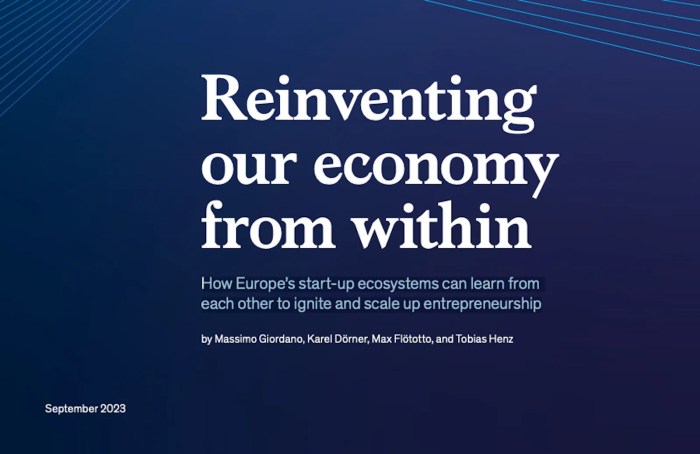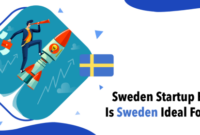Lithuania hidden gem europes startup ecosystem – Lithuania’s Hidden Gem: Europe’s Startup Ecosystem. It’s a statement that might surprise some, but beneath the surface of this Baltic nation lies a vibrant and rapidly growing startup scene. Lithuania’s strategic location, coupled with a government deeply invested in fostering innovation, has created a fertile ground for ambitious entrepreneurs to flourish.
Beyond the picturesque landscapes and rich history, Lithuania boasts a thriving tech ecosystem, attracting talent and investment from across the globe. This burgeoning startup scene is characterized by a strong emphasis on cutting-edge technologies, a collaborative spirit, and a dedication to pushing boundaries.
From fintech and cybersecurity to biotech and gaming, Lithuania’s diverse landscape of startups is making waves on the international stage.
Lithuania’s Startup Ecosystem
Lithuania’s startup ecosystem has emerged as a hidden gem in Europe, attracting entrepreneurs and investors alike. This burgeoning hub boasts a dynamic and supportive environment that nurtures innovation and propels startups to global success.
Government Initiatives and Policies
The Lithuanian government has actively fostered the startup ecosystem through a series of initiatives and policies. These include:
- Tax incentives: Lithuania offers attractive tax benefits for startups, including a 0% corporate income tax rate for the first two years of operation and a 15% flat rate for subsequent years.
- Government grants: The government provides financial support through various grant programs specifically designed for startups, covering areas such as research and development, product development, and market entry.
- Startup visa program: Lithuania has a dedicated startup visa program that simplifies the process for foreign entrepreneurs to relocate and establish their businesses in the country.
- Investment funds: The government has established several investment funds focused on supporting early-stage startups, providing them with access to capital and mentorship.
These initiatives demonstrate the government’s commitment to fostering a thriving startup ecosystem, providing a conducive environment for entrepreneurship and innovation.
Successful Lithuanian Startups
Lithuania has produced a number of successful startups that have made a significant impact on the global market. Some notable examples include:
- Vinted: A leading online marketplace for second-hand clothing, Vinted has grown into a global platform with millions of users across Europe and the United States.
- TransferGo: A money transfer service that offers fast and affordable international money transfers, TransferGo has become a popular choice for migrants and expats worldwide.
- NordVPN: A virtual private network (VPN) provider that offers secure and private internet access, NordVPN has gained a strong reputation for its privacy-focused services and has become a leading player in the VPN industry.
These successful startups demonstrate the potential of Lithuania’s startup ecosystem to produce innovative and globally competitive businesses.
Comparison to Other European Countries
Compared to other European countries, Lithuania’s startup ecosystem stands out for its:
- Strong government support: Lithuania’s government actively promotes and supports startups through various initiatives and policies, creating a favorable environment for entrepreneurship.
- Talented workforce: Lithuania boasts a highly skilled and educated workforce, with a strong emphasis on STEM fields, providing a pool of talent for startups to draw from.
- Affordable living costs: Compared to other major European hubs, Lithuania offers a relatively lower cost of living, making it an attractive destination for startups and entrepreneurs.
- Strategic location: Lithuania’s location in the heart of Europe provides easy access to key markets and transportation networks, facilitating international expansion.
These unique strengths position Lithuania as a competitive and attractive location for startups looking to establish and grow their businesses in Europe.
Key Sectors Driving Innovation in Lithuania
Lithuania’s startup ecosystem is characterized by its focus on specific sectors that have the potential to drive innovation and economic growth. These sectors are attracting investment, talent, and attention from both local and international players.
Fintech
Fintech is one of the most prominent sectors in Lithuania’s startup ecosystem. The country has a well-developed financial sector and a supportive regulatory environment that encourages innovation. This has led to the emergence of a number of fintech startups, which are developing innovative solutions in areas such as payments, lending, and investment management.
- Payments:Lithuanian fintech startups are developing innovative payment solutions, including mobile payments, peer-to-peer (P2P) payments, and cross-border payments. For example, TransferGo is a popular international money transfer platform that allows users to send money to over 60 countries at low fees.
- Lending:Lithuania’s startup ecosystem is also home to a number of innovative lending platforms. These platforms are using technology to provide more accessible and affordable credit to consumers and businesses. One example is Vivent, a platform that offers alternative financing options for consumers and small businesses.
- Investment Management:Fintech startups are also disrupting the traditional investment management industry by providing more transparent and accessible investment options. For example, the company, Tesonet, provides financial technology solutions to businesses, including payment processing and investment management.
The fintech sector in Lithuania is facing challenges such as competition from established players and the need to comply with evolving regulations. However, the sector also has significant opportunities for growth, driven by the increasing adoption of digital financial services and the growing demand for innovative solutions.
Cybersecurity, Lithuania hidden gem europes startup ecosystem
Cybersecurity is another key sector driving innovation in Lithuania. The country has a strong cybersecurity infrastructure and a growing number of cybersecurity startups. These startups are developing innovative solutions to protect businesses and individuals from cyber threats.
- Threat Intelligence:Lithuanian cybersecurity startups are developing advanced threat intelligence solutions that help businesses identify and mitigate cyber risks. For example, Cyber Security Systems, a company focused on developing cybersecurity solutions for critical infrastructure, provides threat intelligence services and solutions.
- Data Security:Another area of focus for Lithuanian cybersecurity startups is data security. These startups are developing solutions to protect sensitive data from breaches and unauthorized access. One example is NordVPN, a popular virtual private network (VPN) service that provides secure internet access and protects user data from cyber threats.
- Cybersecurity Training:Lithuanian cybersecurity startups are also developing innovative training programs to help businesses and individuals improve their cybersecurity awareness and skills. For example, Cybersecurity Training Solutions, a company focused on training and educating individuals and organizations about cybersecurity, offers a range of cybersecurity training programs.
The cybersecurity sector in Lithuania is facing challenges such as the evolving nature of cyber threats and the need to keep pace with technological advancements. However, the sector also has significant opportunities for growth, driven by the increasing demand for cybersecurity solutions and the growing awareness of cyber risks.
Gaming
The gaming sector is also a significant contributor to Lithuania’s startup ecosystem. The country has a strong gaming industry, with a number of successful gaming studios and a growing number of gaming startups. These startups are developing innovative games and technologies that are pushing the boundaries of the gaming industry.
- Mobile Gaming:Lithuanian gaming startups are developing innovative mobile games that are attracting a large audience worldwide. For example, Next Games, a company focused on developing mobile games, is known for its popular mobile game “The Walking Dead: Our World.”
- Esports:Lithuania is also emerging as a hub for esports. Lithuanian gaming startups are developing innovative esports platforms and technologies that are supporting the growth of the esports industry. For example, GoGame, a platform for organizing and hosting esports tournaments, provides a platform for esports enthusiasts to compete and showcase their skills.
- Game Development Tools:Lithuanian gaming startups are also developing innovative tools and technologies that are making it easier for game developers to create and distribute games. For example, Unity Technologies, a company that provides a game development platform, is headquartered in Lithuania and is a leading provider of game development tools.
The gaming sector in Lithuania is facing challenges such as competition from established gaming companies and the need to adapt to evolving gaming trends. However, the sector also has significant opportunities for growth, driven by the increasing popularity of gaming and the growing demand for innovative gaming experiences.
The Talent Pool and Infrastructure: Lithuania Hidden Gem Europes Startup Ecosystem

Lithuania’s startup ecosystem thrives on a foundation of skilled talent and a supportive infrastructure. The country boasts a strong educational system, producing a steady stream of tech-savvy graduates. This talent pool, coupled with a growing number of initiatives fostering innovation and entrepreneurship, provides a fertile ground for startups to flourish.
Educational Institutions and Initiatives Fostering Innovation and Entrepreneurship
Lithuania’s universities play a crucial role in nurturing the next generation of tech talent. Institutions like Vilnius University, Kaunas University of Technology, and Mykolas Romeris University offer specialized programs in computer science, software engineering, and related fields. These programs emphasize practical skills and real-world applications, preparing graduates for the demands of the startup ecosystem.Furthermore, Lithuania is home to several initiatives designed to foster innovation and entrepreneurship among students.
For example, the Startup Lithuania program provides mentorship, workshops, and funding opportunities for young entrepreneurs. The country also hosts numerous hackathons and startup competitions, giving aspiring entrepreneurs a platform to showcase their ideas and connect with potential investors.
Programs and Resources Supporting the Development of Tech Talent
To further strengthen the talent pool, Lithuania offers a variety of programs and resources aimed at upskilling and reskilling individuals in tech-related fields. The government, in collaboration with industry partners, provides training programs in areas like coding, data science, and cybersecurity.
You also can investigate more thoroughly about your laggy wordpress site is annoying customers heres how to speed it up to enhance your awareness in the field of your laggy wordpress site is annoying customers heres how to speed it up.
These programs cater to individuals at different levels of experience, from beginners to professionals looking to enhance their skills.The Code Academy, a non-profit organization, offers free coding courses and workshops to individuals of all ages, promoting digital literacy and encouraging tech-related career paths.
Additionally, several private companies and organizations provide online learning platforms and bootcamps, offering flexible and accessible training options.
The Role of Incubators, Accelerators, and Co-working Spaces in Fostering Innovation
Lithuania’s startup ecosystem is further bolstered by a thriving network of incubators, accelerators, and co-working spaces. These organizations provide a supportive environment for startups to grow and scale their businesses.
- Incubatorsoffer mentorship, access to resources, and workspace to early-stage startups. They provide guidance on business development, marketing, and fundraising, helping startups navigate the initial stages of growth.
- Acceleratorsoffer intensive programs that provide startups with mentorship, funding, and networking opportunities. These programs typically run for a set period, helping startups accelerate their growth and prepare for investment.
- Co-working spacesprovide flexible and affordable workspace solutions for startups and freelancers. These spaces foster collaboration and networking, creating a vibrant and supportive community for entrepreneurs.
Examples of successful incubators and accelerators in Lithuania include:
- Startup Lithuania: A government-backed initiative that provides support and resources to startups across various stages of development.
- Vilnius Tech Park: A hub for tech startups and businesses, offering workspace, mentorship, and networking opportunities.
- Startup Highway: An accelerator program that provides startups with funding, mentorship, and access to a global network.
These organizations play a vital role in fostering innovation by connecting startups with mentors, investors, and other resources. They also create a supportive ecosystem where entrepreneurs can collaborate, learn from each other, and drive innovation forward.
Funding and Investment Opportunities

Lithuania’s startup ecosystem is thriving, and access to funding is a key factor driving its growth. Investors are increasingly recognizing the potential of Lithuanian startups, attracted by the country’s skilled workforce, supportive government policies, and a vibrant entrepreneurial spirit.
Venture Capital Firms and Angel Investors
Venture capital firms and angel investors play a crucial role in providing capital for startups to scale their operations. Lithuania has a growing number of active venture capital firms and angel investor networks that actively seek out promising startups.
- Early-stage investors:Lithuanian startups often receive seed funding from angel investors and early-stage venture capital firms. Notable examples include:
- Nextury Ventures:A leading venture capital firm with a focus on early-stage technology companies. They have invested in companies like TransferGo and Vinted.
- Startup Wise Guys:A pan-European accelerator program with a strong presence in Lithuania. They provide mentorship, funding, and access to a global network of investors.
- LitBAN (Lithuanian Business Angel Network):A network of angel investors who provide funding and mentorship to early-stage startups.
- Growth-stage investors:As startups mature and demonstrate traction, they can access funding from growth-stage venture capital firms. These firms typically invest in companies with proven business models and a strong track record of growth. Examples include:
- Practica Capital:A venture capital firm with a focus on growth-stage technology companies in the Baltics.
They have invested in companies like Tesonet and Nord Security.
- Iron Wolf Capital:A venture capital firm with a focus on technology companies with a global reach. They have invested in companies like TransferWise and Bolt.
- Practica Capital:A venture capital firm with a focus on growth-stage technology companies in the Baltics.
Government Programs
The Lithuanian government is committed to supporting the growth of its startup ecosystem and offers a range of programs and initiatives to encourage innovation and investment.
- Startup Lithuania:A government agency dedicated to supporting the growth of the Lithuanian startup ecosystem. They offer funding, mentorship, and access to a global network of investors and partners.
- InoLink:A program that provides grants and subsidies to startups developing innovative products and services.
- Startup Visa:A program that allows foreign entrepreneurs to relocate to Lithuania and start a business.
Crowdfunding and Alternative Funding Sources
Crowdfunding platforms have become increasingly popular as an alternative source of funding for startups. They allow entrepreneurs to raise capital directly from individuals, often in exchange for equity or rewards.
- Platforms like Kickstarter and Indiegogohave gained traction in Lithuania, providing startups with a platform to connect with potential investors and test the market for their ideas.
- Alternative funding sourcessuch as venture debt, revenue-based financing, and convertible notes are also becoming more accessible to Lithuanian startups, offering flexible funding options tailored to specific needs.
The Future of Lithuania’s Startup Ecosystem

Lithuania’s startup ecosystem is poised for significant growth and expansion, fueled by its dynamic entrepreneurial spirit, supportive government policies, and a burgeoning talent pool. While challenges remain, the future holds immense promise for Lithuanian startups to thrive on the global stage.
Key Challenges and Opportunities
The future of Lithuania’s startup ecosystem is shaped by a combination of challenges and opportunities. The key challenges include attracting and retaining top talent, fostering a more robust venture capital landscape, and navigating the complexities of scaling businesses internationally. However, the ecosystem is also well-positioned to capitalize on emerging trends, such as the rise of artificial intelligence (AI), blockchain technology, and the growing demand for sustainable solutions.
Impact of Emerging Technologies and Trends
Emerging technologies and trends are rapidly transforming the Lithuanian startup landscape. The adoption of AI and machine learning is enabling startups to develop innovative solutions across various sectors, from fintech to healthcare. Blockchain technology is creating new opportunities in areas like supply chain management and digital identity.
Additionally, the growing focus on sustainability is driving innovation in green technology and circular economy models.





